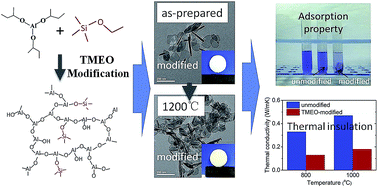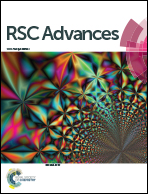Trimethylethoxysilane-modified super heat-resistant alumina aerogels for high-temperature thermal insulation and adsorption applications
Abstract
The study of heat resistance of alumina aerogels has drawn great attention because of their high-temperature thermal insulation and catalyst applications. However, the main problem for the synthesis of heat-resistant alumina aerogels is their limited heat resistance and the drastic decrease of specific surface area upon heat treatment. Herein, trimethylethoxysilane (TMEO)-modified alumina aerogels are prepared by introduction of TMEO during sol–gel and supercritical fluid drying (SCFD) process. The introduced TMEO not only restricts the condensation of surface hydroxyl groups during aging and drying but also produces small silica particles on the alumina surface at high temperatures which inhibits the crystal growth upon heat treatment. Hence, the heat resistance of alumina aerogels is significantly enhanced after TMEO modification. The optimized TMEO-modified alumina aerogel has no cracks and little shrinkage during high-temperature SCFD, and shows no shrinkage and a high specific surface area of 147 m2 g−1 after heat treatment at 1200 °C. The TMEO-modified alumina aerogel possesses enhanced adsorption performance for gentian violet after firing at 1200 °C and shows low thermal conductivities of 0.13 and 0.18 W m−1 K−1 at 800 and 1000 °C, respectively. This may significantly contribute to their high-temperature applications such as thermal insulation, adsorption, catalysts, catalyst supports, etc.


 Please wait while we load your content...
Please wait while we load your content...